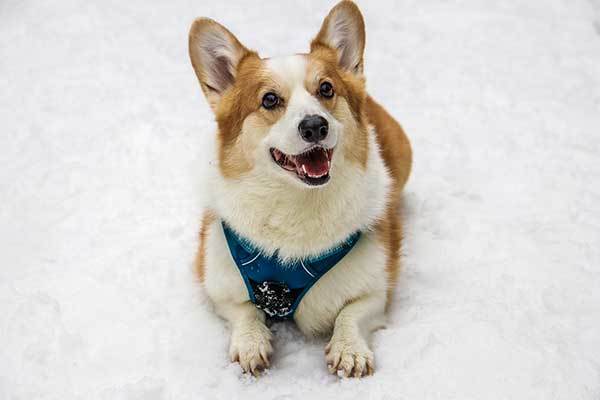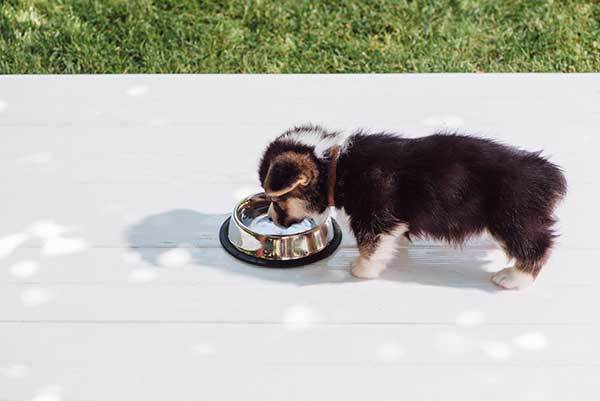Like most dog breeds, corgis are mostly calm, friendly, and playful. Corgis enjoy the company of their owners and are happy to follow them around wherever they go.
These dogs are also reasonably tolerant to other dogs, and will unlikely go on the offensive without being provoked.
You’ll even see them play with your kids, cats, and other pets in your home. But that’s as far as their calmness and friendliness goes.
As a corgi owner, you may have observed a tendency in your furry friend to turn aggressive in an instant, especially to strangers. And you could be wondering, are corgis aggressive?
Compared side by side with other dog breeds, corgis rank among the most aggressive dogs. Their aggression springs from the fact that these dogs are overprotective by nature. It’s important to note that corgis were bred primarily as herd dogs, where their job was to protect their herds from much bigger threats.
Corgi aggression is mostly directed at strangers, other dogs, and anything else that could pass as a threat.
If the dog feels threatened, it will stand up to the threat and possibly start a confrontation by nipping at the threat’s heels, so as to get them to back away.
Read on as we explore the topic of corgi aggression further.
Table of Contents
More About Corgis
The Corgi, also known as Welsh Corgi, is a small dog breed that traces its origin in Wales and the United Kingdom. The name corgi loosely translates to a dwarf dog, which speaks volumes about the size of corgis.
There are two officially recognized corgi breeds, namely the Pembroke Welsh Corgi and the Cardigan Welsh Corgi. The Pembroke Welsh is the more popular of the two corgi breeds and has a history that dates back to the 10th century.
Pembrokes’ higher popularity is attributed to the fact that Queen Elizabeth II prefers them to their Cardigan cousins.

It’s believed that the Queen has owned more than 30 dogs, which are either Pembrokes or crosses between Corgi and Dachshund.
On the other hand, the Cardigan Welsh Corgi is considered endangered. In fact, the Kennel’s Club has listed them among the Vulnerable Native Breeds.
While both the Pembroke Welsh and the Cardigan Welsh corgis come from a common ancestor, they have significant physical differences.
Generally, the Cardigans are larger, both in size and weight. And while their lifespans tend to be similar, Pembrokes are more prone to renal and urethral conditions compared to their Cardigan counterparts.
Traditionally, corgis were bred as herding dogs, where they were mostly used to herd cattle. They were significantly smaller and shorter compared to most herding dogs of their time. But that didn’t make them inefficient.
To deliver on the demanding job of cattle herding, corgis would nip at the heels of the cattle so as to get the animals to move in a particular direction. That’s how they earned the tag “heelers.”
Corgis also succeeded in their jobs easily, thanks to their short stature and incredible agility that helped them to avoid getting trampled by the cattle they were herding.
With time, corgis were adopted as pets by people who were not necessarily cattle farmers. However, the dogs have retained most of their instinctive behaviors, one of which is aggression.
Quick Facts About Corgis
1. Etymology
The name “corgi” means dwarf dog in Welsh. It’s not a derogatory term, but rather a simple explanation of the dogs’ size. Typically, corgis measure between 10 and inches in height and weigh anywhere from 23 to 28 pounds.
2. Separate breeds
As we’ve already highlighted, there are two separate corgi breeds, which include the Pembroke Welsh and the Cardigan Welsh. The two were officially recognized as distinct breeds in 1930.
3. Fascinating history
Welsh legends suggest that corgis were used by fairies to pull or ride coaches into battle. And yes, the backs of corgis are lined with some unique fairy markings.

4. Both breeds have tails
Generally, Pembrokes sport very short tails while their Cardigan cousins have long tails, almost similar to those of foxes.
5. Difference in temperament
Pembrokes tend to be quite outgoing compared to Cardigans that are more reserved.
6. Good with kids
Both kids and corgis share a common trait – playfulness. Added to the dog’s short stature, the two easily get along.
7. Good with other pets
Corgis love other pets, especially other dogs, provided those pets don’t pose any threat.
8. Lifespan
Most corgis live between 12 and 15 years.
9. Smartness
Due to the mentally-demanding job of cattle herding that corgis were bred for, these dogs evolved to be very intelligent.
10. Trainability
Corgis’ remarkable intelligence, coupled with their obedience and a strong desire to please their owners, make them some of the easiest dogs to train.
11. Not hypoallergenic
Since corgis sport a double coat and tend to shed a lot, they give off more dander compared to other dog breeds. That makes the dog unideal for people with dander allergies (or allergies in general).
12. Common health problems
Corgis are some of the healthiest dog breeds. However, they’re still prone to certain health conditions. The most common ones include degenerative myelopathy, hip dysplasia, cataracts, obesity, and cancer.

Are Welsh Corgis Aggressive, and When Does Aggression Start?
Yes, Welsh Corgis are quite aggressive, and corgi aggression starts when the dogs are still very young, typically between 6 and 14 weeks.
During this time, you may observe that the puppies frequently pick up fights amongst themselves. If you also own a cat, the corgis will occasionally direct their aggression to your feline friend.
6 to 14 weeks also happens to be the ideal age that most experts recommend corgi owners to train their dogs to be less aggressive. If you can begin with the training earlier, the better.
Generally, you’ll start by imparting some basic skills in your dog, such as teaching it the difference between chewing and biting. These skills will be invaluable in helping your dog to cope with other members of the house when it’s finally grown.
For pet parents who are keen on buying an adult corgi, experts recommend that you conduct your due diligence. If you can, only buy the dog from a reputable breeder and shun shelter homes.
When you buy a corgi from a licensed breeder, you’ll likely get a detailed profile of the dog with regard to its family history, medical background, and temperament. You can then decide if you want the dog or not based on its background.
Corgis obtained from rescue shelters are usually harder to train. That’s because some of these dogs were rescued from abusive homes and may have developed chronic anxiety disorders, such as post-traumatic stress disorder.
What Causes Corgi Aggression?
First off, just how aggressive are corgis?
On a scale of 1 – 10, corgis can easily score an 8 in terms of aggression. And though we’ve already mentioned it, it warrants repeating that most corgi aggression emanates from the fact that these dogs were bred for cattle herding. Therefore, the dogs have retained their strong wild herding instincts.
As herding dogs, corgis considered themselves the leaders of their pack. They would nip at the heels of the animals that they were herding to get them to move in particular directions. The common farm animals that corgis herded include cattle and horses.

Now, corgis were relatively smaller in size compared to the animals they were herding. However, farmers trusted them to deliver on the demanding role of cattle herding. As such, these dogs succeeded in establishing their dominance in every home.
That means in a family that comprised only humans and farm animals, corgis ranked second in the pecking order, right after their human parents. Anything else, including the animals under their care, other dogs, cats, poultry, etc. ranked below them in the pecking order.
But corgi aggression did not just develop from nipping the heels of the herds under their watch. While herding in the fields, corgis also offered protection to their herds from any potential danger.
Despite their diminished heights and sizes, these dogs would easily stand up to threats from wild animals, particularly foxes and wolves. They also warded off confrontations from other dogs and generally kept their herds safe.
Also, in spite of their diminutive size and other limiting features, corgis developed loud and intimidating barks and growls, which they used to quickly fend off attacks.
All of these roles and adaptations worked towards making corgis the super-aggressive dog that we know today. It’s also worth repeating that the Pembroke Welsh Corgi appears to be the more aggressive of the two corgi breeds.
The following are other possible explanations for corgi aggression.
1. Need to establish dominance
This is what most corgi owners associate their dog’s aggression with. There are numerous situations when your corgi will demonstrate an intent to establish its dominance.
But it mostly happens when you’ve brought a new dog home. Your corgi will be quick to assert its dominance and show the newcomer who’s boss.
2. Sickness
Most dogs, not just corgis, tend to be super-aggressive when they’re sick. That’s especially true for a condition that manifests in physical pain, such as a tissue injury.
When your corgi is suffering from a bone fracture or tissue injury, it may become aggressive whenever you approach it. That’s because the dog believes you may end up touching the tender place.
Common diseases that might cause aggression in corgis include arthritis, thyroid disease, rabies, and brain tumors. Also, a corgi with an upset stomach and abdominal pains will display a degree of aggression.

3. Territoriality
All dogs are territorial by nature. But due to their strong herding instincts, corgis are relatively more territorial than most dogs. Corgis tend to establish territories that they guard with all they’ve got.
The territory could be anything, ranging from a patch in your yard to an outdoor post, toys, litter box, etc. Even the dog’s owner is considered part of its territory, which explains why most corgis are aggressive towards human strangers.
4. Fear
Fear is another common cause of corgi aggression. At times, your corgi may be so frightened that it wants to escape but may find no way of escaping. When the only option left is to defend itself, the dog may become very aggressive.
5. Frustration
Corgi aggression that results from frustration is also known as redirected aggression. That’s because it happens when the dog directs its frustrations to another person or dog that has little to do with its woes.
For instance, your corgi may have lost in a duel to defend its patch. Instead of licking its wounds in humility, the dog might try to put out its frustration on other small dogs, cats, or even kids. It’s more like ‘if I don’t get what I want, everyone else suffers’.
In light of the numerous possible causes of corgi aggression, you might still be wondering, are corgis an aggressive breed?
Yes, they are, and the following section shall highlight some of the tell-tale signs that your corgi is aggressive.
Signs of Aggression in Corgis
The following are the most common signs of corgi aggression;
– Barring of teeth;
– Snarling;
– Growling;
– Curling of lips;
– Biting (varies in intensity from a subtle nip to a full puncture. The bite is usually in quick succession);
– Lunging;
– Rigid body posture;
– Barking and snapping;
– Head pointed upwards with a direct and mean stare; and
– Dominant posture.
ALSO READ: The 14 Best Moving Dog Toys (For Bored & Energetic Dogs)
Forms of Corgi Aggression
So, we’ve already examined the different causes of corgi aggression.
These aggressive behavior manifest in different levels as shown below;
1. Territorial aggression
As the name suggests, this type of aggression results from your corgi’s territorial behaviors.
Territorial aggression occurs when you bring a new dog or pet into the home and your resident corgi feels the urge to assert its dominance.
2. Aggression with food
Corgis display food aggression by growling or snarling at you or another pet that draws close to its food bowl.
Corgis that display food aggression will protect their food bowls with everything they’ve got. These dogs won’t mind taking a bite at anyone or anything that gets uncomfortably close to their bowl, especially if the bowl contains some food in it.
One of the best ways to control corgi food aggression is to assert your dominance and let the dog know that everything belongs to you.
To do that, get your dog to sit down, take the bowl in your hands, and put the food in it. Then, continue holding the bowl for some time. That way, by the time you offer the food to your corgi to eat, the dog will understand that you’re actually doing it a favor.

3. Aggression with toys
Also known as resource guarding or possession aggression, this form of corgi aggression occurs when the dog becomes too obsessed with its toys.
Sometimes, the obsession may make the dog over-protective of anything that it lays claim to, including its bed, food bowl, and even its owner. You’ll notice that your corgi growls or snarls whenever you approach its “possessions.”
An excellent way to redirect toy aggression is to take whatever the dog is obsessed with in your hands and shout “Mine.” As long as the dog puts up a fuss, don’t give it the object. Only wait till the dog has calmed down, then hand it the toy gently so that it understands who the real owner is.
4. Aggression with other dogs
Corgis tend to be aggressive towards other dogs too. And since corgis were bred to be tough, these dogs rarely back down from any dog fight.
To curb this form of aggression, you can consider having your dog on leash whenever you’re out of your home. And that brings into focus another form of aggression – leash aggression.
Leash aggression happens when your pooch feels like you’re trying to restrain it. The best way to deal with leash aggression is to leash-train your dog well in advance.
5. Social aggression
Corgi social aggression has a lot to do with the dog’s herding instincts. As these dogs were trained to herd farm animals, they tend to assert their dominance to kids and other pets.
As you shall find, social aggression is mostly directed at cats, considering that cats like fooling around with dogs and love to be chased.
Like leash aggression, social aggression results from inadequate training and socialization.
You’d be interested to note that the best way to deal with social aggression is to have your corgi on a leash. So, the importance of training and socializing your canine early enough cannot be overemphasized.
6. Corgi aggression at night
This is when your corgi becomes abnormally worked up at night. It happens when your dog associates darkness with a form of danger.
Abnormal corgi barking and biting at night are the sure signs of aggression at night. To tame this behavior, you might consider leaving some residual lights on as you go to sleep at night.

How to Train an Aggressive Corgi
If you’re a loving and proud corgi owner and your pooch occasionally exhibits any of the aggressive tendencies that we’ve highlighted, you may be wondering what to do with an aggressive corgi.
Well, you don’t need to fret, as there are several measures you can implement to help your corgi overcome undue aggressive behavior.
So, how do you calm an aggressive corgi? Let’s find out;
Step – 1: Find the root cause
The very first step in overcoming corgi aggression is to get to the bottom of the behavior and uncover the underlying cause for it.
Corgis are instinctively aggressive, that’s a given. However, there are certain instances when the behavior might be triggered by an external stimulus, and we’ve pointed out quite a few of those.
It’s important to note that your corgi can be one of the coolest dogs in the neighborhood. But it only takes a subtle provocation and your furry, little friend is thrown off balance.
Some of the common triggers include a particular family member, pet, the environment, certain colors and sounds, etc. Succeeding in finding the root cause of the problem is as good as solving half of it.

Step – 2: Address the problem
So, after unearthing the reasons behind your corgi’s aggression, now craft the most appropriate solution for the problem. Here, experts recommend exercising caution, patience, and diligence.
First, never approach your dog when it’s in a tensed state. The best thing to do is to try and not move, as that will help to diffuse the tension.
If you were presently looking at the dog, drop your gaze and relax your muscles. You might even consider sitting down. The goal is to help the dog feel comfortable being around you even in its tensed state.
Another thing you should never do while addressing corgi aggression is to reward the dog inappropriately. Rewards are part and parcel of training an aggressive corgi. However, the treats should be well-timed. You want the dog to associate the reward with a good behavior.
For instance, if your corgi incessantly barks at a stranger and then stops barking on its own, don’t reward it. Instead, only reward the dog if it stops barking on your command.
Also, never shout at or hit your dog while it’s anxious. Dogs associate shouting or hitting with an urge to continue with the behavior. So, yelling at your pooch while it barks at a stranger will only encourage the dog to bark harder.
Lastly, always train your corgi while it’s still young (between 6 and 14 weeks). Pups are far easier to train and socialize than adult dogs.
Step – 3: Visit the vet
Vet visits should be a matter of routine, and shouldn’t only happen when you’re trying to find out the reasons behind your corgi’s aggression.
Your vet will thoroughly examine the dog each time and detect any underlying medical conditions that might cause the dog to behave irrationally. And if the dog requires progressive care, the vet might recommend a dog behavioral specialist.

Other Frequently Asked Questions on Corgi Aggression
Do corgis bark a lot?
Yes, corgis tend to bark a lot. In most cases, they bark at strangers or whenever they feel threatened. In other instances, such as when you’re in the next room, your corgi may bark in a bid to join you.
Remember, these are herd dogs and the goal of any herd is to stay together.
One of the worst things about corgi barking is that you can never tell when it will degenerate into a bite. So, it’s important to act fast. And that brings us to our next question…
ALSO READ: How to Stop Your Dog from Barking (5 Simple Ways)
Do corgis bite?
Biting in corgis starts when the dogs are young. Corgi pups tend to play with their owners a lot, and part of playtime includes biting or nipping.
At a young age, corgi bites are usually cute and harmless. But the bites get stronger and more painful as the dog grows older. That underscores the importance of redirecting corgi biting before it develops into a full-blown aberrant behavior.
Are corgis aggressive chewers?
Corgis are aggressive chewers, but they sort of prefer to bite than chew. However, when they lack enough physical or mental stimulation, the dogs can chew at anything they can lay their eyes on.
You can help an aggressive chewer by getting the dog a chew toy or plenty of toys to keep it stimulated even whilst you’re gone. Also, always leave some soft noise and residual lights on, especially in the dog’s room at night before you go to sleep.

Which is more aggressive between male and female corgis?
So, you may be wondering, are male corgis aggressive? Or, are female corgis aggressive?
Male or female, corgis are naturally aggressive. Aggression can be more intense in one gender, depending on the circumstances.
For instance, males are usually more aggressive during the mating season while females can get wilder when they’re breastfeeding.
So, Are Corgis Dangerous?
Let’s just say that when corgis are calm, they’re really calm. But when they get wild, not even their owners can calm them down.
To stay safe, ensure your corgi is well-socialized, well-trained, and is always mentally and physically stimulated.
Checkout Our Favorite Dog Products
1. BEST PUPPY TOY
We Like: Snuggle Behavior Toy with Heart Beat & Heat Pack – Ideal toy for new puppies.
2. BEST DOG TRAINING PROGRAM
We Like: Doggy Dan The Online Dog Trainer – Stop any dog problem and raise the perfect puppy with The Online Dog Trainer.
3. BEST DOG FOOD
We Like: Royal Canine – Since 1968, Royal Canine has been at the forefront of pet health nutrition.
4. BEST DOG DNA TEST
We Like: Embark Dog DNA Test – Embark screens for over 250 dog breeds + tests for 170+ genetic diseases including MDR1 drug sensitivity, glaucoma, degenerative myelopathy, and dilated cardiomyopathy, some of the most common adult-onset diseases in dogs.
5. BEST DOG PUZZLE TOY
We Like: Outward Hound Interactive Puzzle Toy – Every dog loves chasing squirrels at the park. The Outward Hound Hide-a-Squirrel Puzzle Toy gives your dog the same feeling as though he was outdoors chasing live squirrels.
6. Best Calming Treats for Dogs
We Like: FurroLandia Hemp Calming Treats – These soft chews will calm your dog so it can peacefully endure stressful situations, such as long car trips, visiting unfamiliar places, or hearing Thunder. Ideal for all dog breeds & sizes.




